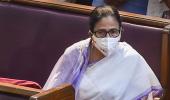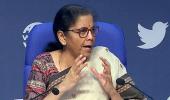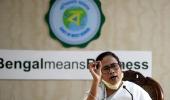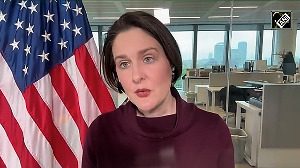The combined Left parties drew a blank in the polls to the assembly which they had run with an overwhelming majority for 34 long years, with their vote share dwindling to a mere 5.47 per cent in 2021.

A graffiti on a central Kolkata wall said "Long live Marxism". Someone with a wry sense of humour had cut out the word 'live' and scrawled 'dead' on top.
The results of last week's counting of votes cast in the crucial West Bengal elections seemed to bear this out.
Not only had the combined Left parties drawn a blank in the polls to the assembly which they had run with an overwhelming majority for 34 long years, their vote share had dwindled to a mere 5.47 per cent in 2021, down from 30.1 per cent in 2011 when they lost the elections to Trinamool Congress supremo Mamata Banerjee's juggernaut.
In the clash of the titans where the TMC was in a straight fight with the Bharatiya Janata Party in most constituencies, the once all-powerful Left seems to have been squeezed into oblivion.
Even in the 2016 assembly elections, the Left parties had managed to get 25.69 per cent of the votes polled.
"We lost because other factors like anti-incumbency were overridden by people's anxiety to halt the BJP from capturing Bengal," admitted Nilotpal Basu, Communist Party of India-Marxist Politburo member and former Rajya Sabha MP.
Analysts said that the TMC's win was in part powered by a gain of at least five per cent of the popular votes which normally go to the Left, as electors decided to ignore issues like corruption to exercise their franchise against the BJP.
"In 2019, when the BJP won 18 Lok Sabha seats and bagged about 40 per cent of the votes cast, the Left and the Congress had ceded grounds to the rightist party, this time the Left votes went to the TMC," said Dipankar Bhattacharya, General Secretary of the CPI(ML)- Liberation party which came out with a 'No Vote to BJP' campaign.
Bhattacharya, an alumnus of the Indian Statistical Institute and his team have been researching on the just-concluded elections at their office in Creek Row area.
The sharp drop in votes polled has dismayed CPI-M cadres, and the central leadership of the party will review the election results to analyse what went wrong and to chart out a future course of action.
Even Jadavpur, long dubbed 'Leningrad of the East' which has elected a Left candidate in every election since 1967, except once, fell before the Trinamool onslaught.
To rub in the humiliation, veteran CPI-M leader Sujan Chakraborty lost by a margin of nearly 40,000 votes to a little-known TMC debutante in a seat, where it was said that the Left "would win even if the party fielded a lamp post with the hammer and sickle sign on it".
"The Kolkata city voting patterns show that people decided to stop the BJP and they chose to gravitate towards the TMC it is a limited mandate from the Left-liberal-secular opinion against the BJP," Basu said, adding "the ruling party should not consider this as their vote. As Leftist forces consolidate, it will regain this vote share".
However, independent analysts do not believe getting back vote shares will be a simple task for the Left parties led by the CPI-M.
"The crisis the Left is facing is deep rooted. Its falling vote share is just an indicator of a deeper malaise," said Rajat Roy, political analyst and member of the think tank Calcutta Research Group.
The fall of the Left is underlined by the fact that just 17 years ago it was the third-largest party with 59 MPs of the 543-strong Lok Sabha, with 35 seats coming from West Bengal alone.
Since then, its sway over the electorate has dwindled to a situation where it has no MPs from West Bengal in the Lok Sabha.
CPI-M's vote share alone has fallen in recent years from 19.75 per cent in the 2016 assembly polls to 6.34 per cent in the 2019 Lok Sabha elections when a whispering campaign "chup chap padma phoole chaap" (secretly vote for BJP) saw a section of its voters swung to the BJP as a reaction to TMCs attitude towards the Left.
In 2021, the CPI-M managed to garner just 4.73 per cent of votes polled as the pendulum shifted towards the TMC.
"The once revolutionary party which rode to popularity on the back of peasants' movements and trade union militancy has been living in a cocoon for long. Since the 1990s, instead of mass contact movements, it has depended on party apparatchiks like Laksman Seth of Haldia and Anil Basu of Hooghly to deliver votes. Their decline now defines the Left's hold over voters," Roy said.
The CPI-M, which stormed into power in 1977 following a popular upsurge against then chief minister Siddhartha Shankar Ray's brutal suppression of the Naxal movement, industrial stagnation and emergency excesses, had also failed to live up to people's expectations with its inability to create jobs, encourage industry and by lowering public education and healthcare standards.
However, insulated from the two major political upheavals that shook India in 1990s the Mandal agitation and the Ram Mandir stir and bereft of strong opposition, Bengal remained a unique Left citadel, even as the Communism crumbled in Eastern Europe and embraced capitalism in China.
The rise of Mamata Banerjee's strident street-smart politics in the late 1990s and 2000s, which used people's movements against eviction of hawkers in Kolkata, agitations against land acquisition in Singur and Nandigram, severely challenged the Left.
"The connect with ordinary people, which was their (Leftists) hallmark snapped... CPI-M leaders were living in a world of doctrinaire, while the lower cadres were reaping the gains of office," Roy explained.
By 2011, Banerjee had breached the 'Red fortress' and by 2021, the Left was misreading its voters' mind, Bhattacharya claimed.
"The traditional Left completely misread the situation in this election... they should have seen the significance of the battle for Bengal. Here, we had a party backed by Rashtriya Swayamsevak Sangh, a 'fascist' organisation, out to capture Bengal. Yet they concocted slogans that equated the BJP and the TMC, and called them 'two sides of the same coin'. This did not convince even their own people," he said.
The CPI(ML)-Liberation leader felt that class concerns where the "poor saw the BJP as a rich man's party", gender concerns raised by comments on "love Jihad and Romeo squads" and "issues of Bengali identity" united voters against "attempts to polarise them communally".
The Left's electoral alliance with the newly-floated Indian Secular Front led by a conservative Islamic cleric, known for controversial comments, too did not go down well with Leftist liberals. "The tie-up with Abbas Siddique simply backfired on them," said Bhattacharya.
The Left, analysts believe, now has to reinvent itself and go back to mass contact movements to stay relevant.
Cadres of Leftist students' unions, who fanned out in districts of south Bengal to campaign for CPI-M's new faces such as Jawaharlal Nehru University Students’ Union president Aishe Ghosh and party's youth wing state president Minakshi Mukherjee, are expected to lead the mobilisation needed to bring back it into reckoning.
"Our young candidates have got relatively good vote share... they are our hope," Basu said.
According to collated data based on Election Commission figures, the Left had registered its best-show in south-east Bengal where it received nearly nine per cent of the popular votes. This is also the region where most of the young faces were fielded.
"Let us see what lessons the Left draws from its rout. We have to step up our role," said Bhattacharya. While Roy added, "...the key is mass connects, no party can survive without mass movements."











 © 2025
© 2025